Elon Musk Donates: The Jaw-Dropping $5.7 Billion Gift That Shocked the World!
Elon Musk, the billionaire entrepreneur and CEO of Tesla, made headlines with a substantial charitable donation in late 2021. He transferred $5.7 billion worth of Tesla stock to charity, marking one of the largest single donations in recent years. This generous act sparked widespread interest and speculation about the recipients and impact of Musk's philanthropy.
The donation consisted of 5,044,000 Tesla shares, as revealed in a filing to the U.S. Securities and Exchange Commission. While the specific beneficiaries were not initially disclosed, the scale of the gift underscored Musk's growing involvement in philanthropic endeavors. This move aligned with his previous statements about donating more of his wealth to charitable causes.
Musk's donation represented a significant portion of his vast fortune, which has fluctuated but often exceeds $200 billion. The gift raised questions about the potential influence of such large-scale philanthropy and how it might shape various charitable sectors. As details emerged, the public and media alike eagerly awaited information on which organizations or causes would benefit from this substantial contribution.
Elon Musk's Philanthropic Philosophy
Elon Musk's approach to philanthropy aligns with his innovative mindset in business and technology. He focuses on high-impact initiatives that address global challenges and push the boundaries of human progress.
Musk believes in leveraging his wealth and influence to tackle pressing issues facing humanity. His philanthropic efforts often center around scientific research, sustainable energy, and space exploration.
The Musk Foundation, established in 2002, serves as the primary vehicle for his charitable giving. It supports causes ranging from renewable energy development to science education and pediatric research.
Musk has pledged to donate the majority of his wealth during his lifetime or in his will. This commitment is part of The Giving Pledge, an initiative encouraging billionaires to contribute a significant portion of their net worth to philanthropic causes.
His donations often target specific projects with potential for transformative impact. For example, Musk contributed $10 million to the Future of Life Institute for research on keeping artificial intelligence beneficial to humanity.
Musk's giving strategy emphasizes direct action and measurable outcomes. He prefers to support organizations and projects that can demonstrate tangible results and scalable solutions to global problems.
Major Donations and Initiatives
Elon Musk has made significant philanthropic contributions through various channels. His donations span multiple sectors, including science, education, and humanitarian efforts.
Funding the Musk Foundation
The Musk Foundation serves as a primary vehicle for Elon Musk's charitable giving. Established in 2002, it focuses on renewable energy research, human space exploration, pediatric research, and science and engineering education.
In recent years, the foundation has increased its giving. Musk donated nearly $6 billion worth of Tesla stock to the foundation in 2021. This substantial contribution positioned the Musk Foundation to make larger grants and support more ambitious projects.
The foundation's grants have supported diverse causes. These include disaster relief efforts, STEM education programs, and research initiatives in artificial intelligence and renewable energy.
The XPRIZE Contribution
Musk's involvement with XPRIZE demonstrates his commitment to driving innovation through competition. In 2021, he pledged $100 million for the XPRIZE Carbon Removal competition.
This initiative aims to develop technologies that can remove carbon dioxide from the atmosphere or oceans. The competition runs until 2025, encouraging teams worldwide to create and demonstrate solutions to combat climate change.
Musk's contribution to XPRIZE aligns with his broader goals of promoting sustainable technologies and addressing global environmental challenges.
Support for the World Food Programme
In 2021, Musk made headlines with his interaction with the United Nations World Food Programme (WFP). Responding to a challenge on Twitter, he pledged to donate $6 billion if the WFP could explain how it would solve world hunger.
While the full $6 billion donation did not materialize as initially proposed, Musk did make a significant contribution. He donated $5.7 billion worth of Tesla shares to charity in 2021, with some speculating that a portion went to the WFP.
This donation highlighted Musk's interest in addressing global hunger and poverty issues, albeit through his unique approach of challenging organizations to demonstrate impact.
Educational Initiatives and Ad Astra
Musk's philanthropic efforts extend to education, with a focus on innovative learning models. In 2014, he founded Ad Astra, a school for his children and those of SpaceX employees.
Ad Astra's curriculum emphasizes problem-solving, critical thinking, and hands-on learning in fields like artificial intelligence, robotics, and applied science. While small in scale, it reflects Musk's vision for education that prepares students for future technological challenges.
Beyond Ad Astra, Musk has supported broader educational initiatives. He donated $50 million to the AI Foundation, which works to ensure AI development benefits humanity. This aligns with his interest in shaping the future of technology education.
Business and Stock Donations
Elon Musk has made substantial charitable contributions using shares from his companies Tesla and SpaceX. These stock donations have significant tax implications and demonstrate Musk's approach to philanthropy through his business holdings.
Tesla Shares for Charity
Musk has donated large amounts of Tesla stock to charitable causes. In 2021, he gave approximately $5.7 billion worth of Tesla shares to an unspecified charity. This donation of 5,044,000 shares occurred between November 19-29, 2021.
In 2022, Musk continued this pattern by donating Tesla shares valued at $1.95 billion. The following year, in 2023, he donated $108 million in Tesla stock to unnamed charities.
These stock donations allow Musk to make significant charitable contributions while potentially reducing his tax burden. By donating appreciated stock, he can avoid capital gains taxes while receiving a tax deduction for the full market value of the shares.
SpaceX Contributions
While less publicized than his Tesla donations, Musk has also made charitable contributions using his SpaceX holdings. As a private company, details of SpaceX stock donations are not publicly disclosed to the same extent as Tesla's.
SpaceX contributions have supported causes aligned with the company's mission, such as STEM education and space exploration initiatives. Musk has used SpaceX resources for charitable efforts, including donating Starlink terminals to provide internet access in disaster-stricken areas.
The use of both Tesla and SpaceX stock for philanthropy highlights Musk's strategy of leveraging his business success for charitable impact. This approach allows him to make substantial donations while maintaining control of his companies.
Impact on Public Perception and Media
Elon Musk's charitable donations have significantly influenced public perception and media coverage. His high-profile status as a tech billionaire amplifies the attention given to his philanthropic efforts.
Media outlets often highlight Musk's large donation amounts, creating an impression of substantial impact. This coverage shapes public opinion, portraying Musk as a generous benefactor to various causes.
The tech mogul's charitable activities have sparked discussions about the role of billionaires in addressing global issues. Some view his donations positively, seeing them as a responsible use of wealth.
Critics, however, argue that the media focus on donation amounts may overshadow the actual effectiveness of these contributions. This has led to debates about the true impact of billionaire philanthropy.
Charitable organizations receiving Musk's donations often experience increased visibility. This media attention can boost their profiles and potentially attract additional support from other donors.
Musk's approach to giving has influenced discussions about transparency in philanthropy. His sometimes unconventional methods have prompted media scrutiny and public discourse on the most effective ways to donate.
The media's portrayal of Musk's donations has also affected perceptions of other billionaires. It has intensified the spotlight on wealthy individuals' charitable activities and their broader social responsibilities.
Challenges and Criticisms
Elon Musk's philanthropic efforts have faced scrutiny and debate. His approach to charitable giving has sparked discussions about effective altruism and the role of billionaires in addressing global issues.
Debates on World Hunger Solutions
Elon Musk engaged in a public exchange with David Beasley, director of the United Nations World Food Programme, regarding solutions to world hunger. Musk challenged the WFP to provide a detailed plan on how $6 billion could solve world hunger. This led to discussions about the complexities of addressing global food insecurity.
The WFP responded with a proposal, but critics argued it fell short of a comprehensive solution. Some praised Musk for demanding accountability, while others viewed his challenge as a deflection from meaningful action.
Experts pointed out that solving world hunger requires long-term systemic changes beyond one-time donations. This debate highlighted the limitations of relying solely on billionaire philanthropy to address complex global issues.
Comparisons with Other Billionaires
Elon Musk's charitable giving has been compared to that of other billionaires, particularly Jeff Bezos and MacKenzie Scott. Critics have noted that Musk's donations represent a smaller percentage of his wealth compared to some of his peers.
MacKenzie Scott's rapid distribution of billions to various causes has been contrasted with Musk's more targeted approach. Scott's focus on social issues has drawn both praise and criticism, with Musk suggesting her donations might not address the most pressing global challenges.
The differing philanthropic strategies have sparked debates about effective giving:
Speed vs. caution in distributing funds
Supporting established charities vs. creating new initiatives
Focusing on immediate relief vs. long-term solutions
These comparisons have intensified discussions about the responsibilities of the ultra-wealthy in addressing societal problems.





